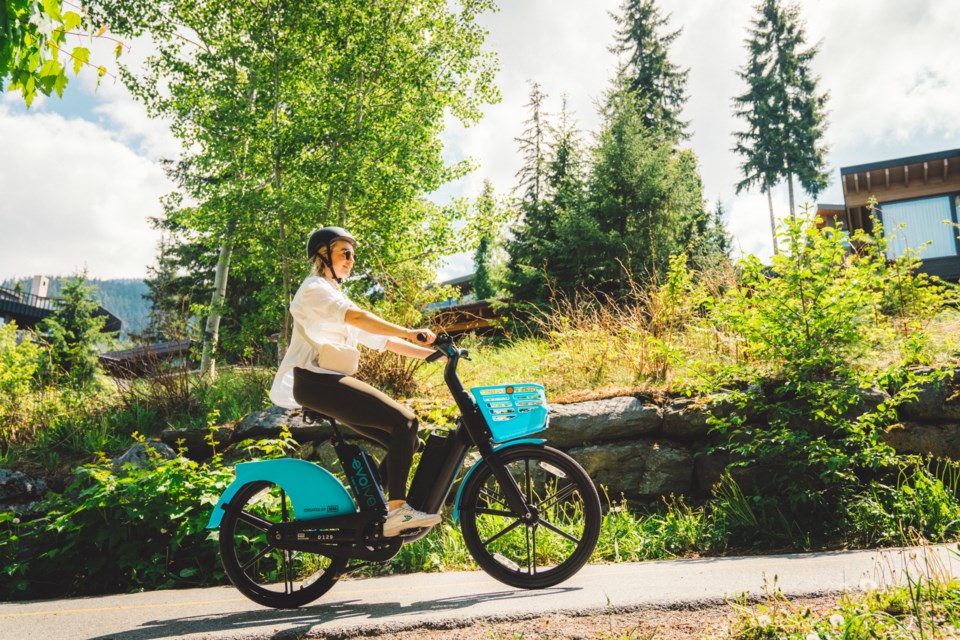In hard numbers, data released by the BCAA last week for its Evolve e-bike share showed that between 4,600 riders, there were almost 7,000 trips taken during the program’s six-month runtime between May and October in 2023—more than six times the number taken during the 2022 program.
Those rides added up to 58,000 kilometres of pedalling around town—or the equivalent of one Whistler local cycling to and from Vancouver 240 times.
The BCAA seemed chuffed with those numbers, which translate to saving 12,500 kilograms in greenhouse gas (GHG) emissions.
Spokesperson for BCAA’s Evolve program, Leanne Buhler, told Pique the Whistler program is helping build confidence that micro-mobility projects are sustainable, and applicable across smaller communities and not just large cities like Vancouver.
“Many companies including ourselves have confidence that e-bike shares and e-scooter shares and micro-mobility in general does have a future of being sustainable,” she said.
“It takes a little bit of scale, and developments in the industry to get there and make them efficient and well-performing and make sure they’re serving the needs of people, (but) we are really pleased because a lot of the initial data shows that people are really using the service as it should be used, which is replacing vehicle trips and really getting people out of their cars and into active and sustainable transportation.
“And that’s really the goal of micro-mobility, to provide people with a great option and an alternative to vehicles, and we are seeing that behaviour tick up more and more each year.”
Survey results gathered from users showed they are using the program in the spirit in which it was intended, too.
An RMOW communications official said the municipality is pleased with the initial data released from the program, “especially seeing that 59 per cent of survey respondents said they would have used a vehicle to get around, if the service was not available.”
In addition, 76 per cent of riders said they thought the e-bike share “added value” to the overall transportation network in the community.
For BCAA, the numbers are promising.
“Whistler is a good model to show that smaller communities can work as well,” said Buhler, who added many other municipalities around the province are gearing up to release RFPs for 2024 programs—among them, larger communities like Coquitlam and Surrey.
Whistler’s 2023 program consisted of 70 bikes spread across 12 parking zones for a six-month period, in an expansion to the original 2022 demonstrator program where there were 60 bikes across an initial eight parking zones.
BCAA’s Evolve e-bike share program was selected by the RMOW back in 2022 because it was presented as a no-cost demonstrator project for that year. In 2023, the program again required no injection of funding from the RMOW to operate, with only minimal staff time dedicated to helping coordinate the project. The same setup will be in place for the 2024 program. In fact, according to the RMOW, BCAA is charged fees to use municipal infrastructure for storage and charging, “as would be the case with any relationship with a vendor.”
Looking ahead, the 2024 program in Whistler will likely get off the ground slightly earlier to take advantage of the early season—or as soon as the trails are clear of snow in the spring.
Buhler said the 2023 data will go a long way in informing what the 2024 program looks like.
“The longer season was great for us to really get our stride and make sure that the system was in peak condition for the whole season, in that we had more bikes at the start of the program,” she said.
“That made a difference in making sure people could really access the bikes where and when they needed them.”
Whistler locals who used the program and have feedback are encouraged to reach out to the BCAA with their thoughts.
“We’re seeking feedback from the community on more locations that would be valuable for them to use the system, and so we’re always open for feedback through surveys and through our various customer service channels, and would love to hear about what the people want,” Buhler said.
Locals can contact the BCAA team behind the program by emailing [email protected].
A full report on the program will be delivered to the RMOW in December. The municipality will make decisions about the longer-term future of the e-bike share contingent upon their analysis and community feedback.
The RMOW is also asking local bicycle rental and tourism companies to put in their two cents: when the program was originally announced in 2022, the impact on local business was a sticking point.




